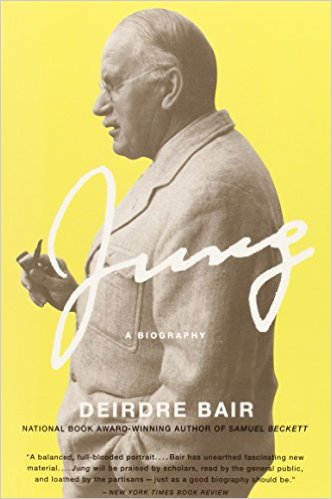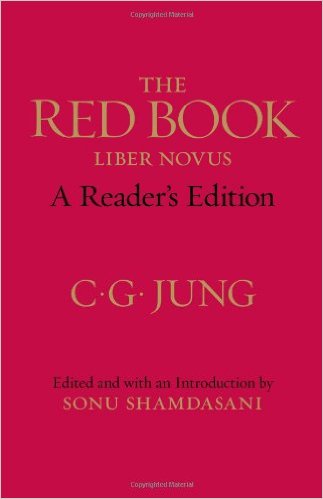I periodically pick up Deirdre Bair’s biography of Jung and page through it, reading a chapter here, more chapters there I’ve never been able to sit down and read it from cover to cover. With the index, it’s nearly 900 pages long.
But tonight I happened to turn to a section of Jung’s The Red Book, a massive journal that started because of, as Bair describes it, “his first psychotic vision” during a journey by train to Schaffhausen. “The vision occurred after he decided it would be dishonest to continue treating patients using ‘Freudian theoretical assumptions.’” This happened around the time of his break with Freud, war was imminent, and Jung was “beset by so many other dreams and fantasies…that he was led to formulate the theory of active imagination, the process of concentrating on a single image or event long enough to allow it to develop its own volition.”
This sounds a lot like what happens in lucid dreaming, where you wake up inside a dream and seize on a particular image that will enable you to move more fully into the dream. The idea with lucid dreaming, though, is that by seizing on an image, you eventually are able to control and manipulate the dream.
On another train trip in 1914, Bair writes, Jung realized that that the only way he could define a system separate from Freud’s would be to treat himself as though he were his own patient. So he decided to confine his new journal to “language metaphors,” and allow the unguided flow to pour out of him. The first time he sat down to write, “he remembered hearing a distinctly female voice speaking quietly but with authority. “This is art,” she said.
According to Bair, this made Jung angry because he thought he was constructing “an empirical science.” Eventually, this female voice morphed into a male voice, Elias, who didn’t stick around long, and then into a second male voice, Philemon. “Jung described Philemon as the pagan voice of an old man of ‘simply superior knowledge.
To me, this sounds like channeling. Or like the muse of a deeply creative person whose voice and personality are distinctly different from that of the individual. Jung believe that Philemon was teaching him “psychological objectivity, the reality of the soul.
Many of his Philemon writings are in The Red Book, which the Jung family kept under wraps for years because it smacked of madness. It includes not only Jung’s writings during this period, but his sketches, paintings, doodle, the inner self made manifest in art and words.
Years after Jung started The Red Book, he allowed his translator and friend, R.F.C. Hull to read The Red Book. Hull is best known for his translation of The Collected Works of C.G. Jung. His take on The Red Book is fascinating for its insight into the connection between madness and genius, between creativity and the unconscious, and into Jung himself.
“Talk of Freud self-analysis – Jung was a walking asylum in himself, as well as its head physician.” Hull thought The Red Book provided “the most convincing proof that Jung’s whole system is based on psychotic fantasies – which of course it is – and therefore the work of a lunatic.” But he compared Jung to a medicine man, a shaman “who understood madness and can heal it, because at periods they are half-mad themselves.”
Jung’s achievement, Hull concluded, “…lay in hammering that material into a system of psychotherapy that worked.”
I think Hull missed the mark in many respects. But in all fairness to Hull, he was Jung’s contemporary and was seeing the material from that perspective. To me, it seems that Jung’s legacy went well beyond his system of psychotherapy.
His work hurled open doors about the nature of human consciousness and how it impacts the nature of our personal realities, what we experience day to day in our own lives. It coincides with fairly recent discoveries in quantum physics that tell us an event doesn’t happen until it is observed, which is another way of saying that consciousness is the sum total. Everything. Without it, a thousand trees can fall in a forest but if there’s no one around to see it, to hear it, has it actually happened?
Thanks to Jung, the idea that we create our lives from the inside out, through our thoughts, beliefs, desires, intentions- through everything that makes up our consciousness – is not quite the outlier notion it once was. Debate the idea with yourself, with family and friends. Argue for or against it. Think about it, mull it over, seriously consider it. And then ask yourself: Suppose Jung was right?
And suppose synchronicity is the place where it all bleeds out, coalescing in seemingly miraculous and stunning ways? Suppose synchronicity, the term that Jung coined, is the voice of that quantum theory?










Jung came from a spiritualist family, and was exposed to mediums in his youth, so the idea of channelling, being a trance medium for a non-material entity, etc. would not have been a novel idea for him, and the idea of channelling entire books or works of art, such as Mme. Blavatsky, was widely accepted in that community. I think he was a natural medium, and spiritualists would argue that instead of “madness”, he had opened himself to direct contact with spirit guides and the “other worlds”.
Which is exactly what a shaman does, either through ritual, trance, ordeals, etc. J oseph Campbell believed shamans are naturally chosen through early psychotic breaks, but many disagree with him, pointing out that our notions of madness are culturally biased in many ways.
But he was a great door opener for many…….
I think Jung was, at heart, a mystic and a shaman who was also quite psychic. I see The Red Book as a masterpiece, not a chronicle of madness.
Whew! I feel so far behind in the aspects of Jung you bring up here. I guess it’s time for me to delve back into that mind again. Bair’s biography is available right now at my local library. I’m in! This is all very fascinating to me. I think Jung was one of the most profound personalities of previous centuries. Thank you. 🙂
You’ll enjoy Bair’s bio, DJan.
I continue to have a problem with the trees falling in the forest theory……which leads to even more questions about this and that. However, as I battle an increasingly debilitating illneess, I recently find myself pondering, wondering, meditating on so very many issues and ideologies that I have more or less accepted as Truths throughout the decades. Last week, my husband came very, very close to transitioning from this life. He was in the Intensive Cardiac Care Unit at our hospital in critical condition, with violently raging strep pneumonia, atrial fibrillation that simply refused to convert to normal heart rhythm, and out-of-control hyperglycemia….his blood sugar level was 470. He was perilously close to physical death. The medical team pulled him through and he’s OK. But that experience brought even more profound questions in my mind regarding the true nature of Consciousness and our concepts of Reality….especially “life” after the death of these fragile vehicles our souls inhabit. Even as a born medium with decades of contacts with entities in other dimensions, I am discovering that I am no longer able to seek and/or study complex
philosophies, but instead, am needing to “turn the volume down” on the complicated
hypotheses and allow myself to simply “BE”….simple. Trish once told me that I am a “relentless researcher”, and she was spot on. I’ve spent my adult life starving for knowledge and awareness, delving, digging into the hidden mysteries that abound. But now….now, this strange space I occupy indicates a compelling need to “rest” my mind and thoughts. Nevertheless, I shall continue to enjoy the Synchro blog and all the comments, and to wonder if my previous sense of enchantment with seeking Truths will return. I am grateful beyond words to Trish and Rob and to all the Synchrosecrets “gang” for so much that I have learned here……as the clock winds down for me. Being a participant in this diverse community of spiritual friends has been a JOY filled with enlightenment and has provided me with a unique place where I am able to be ME ; to express ME in ways I cannot, in my mundane life. This blog has offered me opportunities to be myself, and that is a blessing, a gift, without price. From my heart, Thank you.
Thanks, C.J. for your kind comments about the blog, and for participating over the years.
Sounds like an incredible read into someone who really did change the way we think of the human mind. Thanks so much for sharing your thoughts on this!
I read Bair’s bio on Jung – found it most interesting for so many reasons. Like his relationships with his wife and live in “other wife,” Tony Wolf. Also the fact that Jung’s wife was very wealthy enabled him to do his research in freedom from having to bring in that money from “jobs.” Also the fact that so many of his patients and supporters were women. We could write a book just on the facts of Jung’s life in Bair’s bio.
Every time I pick up the book to read a chapter, I’m riveted.